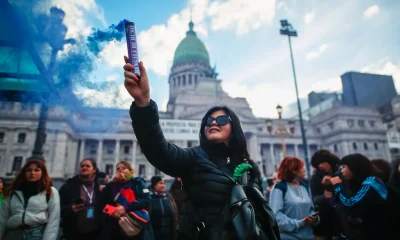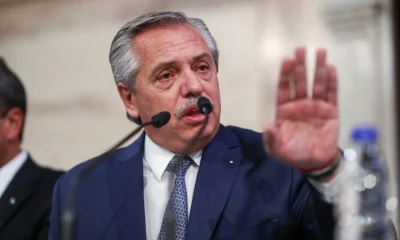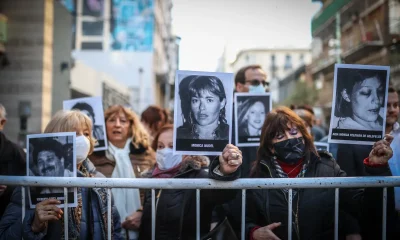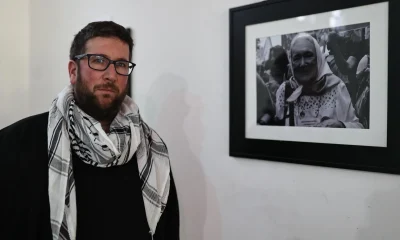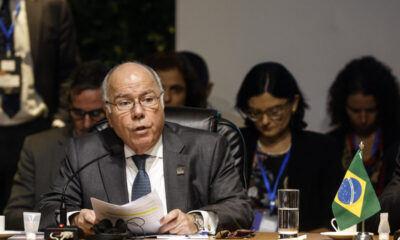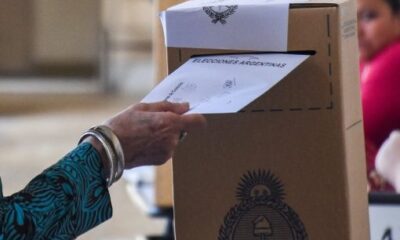International
Milei celebrates 100 days as president, between the controversy and his obstinacy about the course

The president of Argentina, Javier Milei, celebrates 100 days of management this Tuesday, in which he has shown obstinacy in the course to achieve fiscal balance and reduce the weight of the State to lower inflation, despite the setbacks in Congress; the fall in purchasing power and criticism for his confrontational method.
In several publications that Milei replied on his social network account X, a direct media that he appreciates a lot, he celebrated that he “avoided the hyperinflation” that was “activated” by his predecessor, the Peronist Alberto Fernández (2019-2023); he began the “sustained process of disinflation” and the decrease in country risk, today at 1,520 basis points.
In terms of security, he replied messages that say that he “ended the pickets” and “he stood against insecurity and narco-terrorism,” and as for corruption, “the amount of illegalities” that he is discovering.
Milei took advantage of this Tuesday to exhibit the unit with her vice president, Victoria Villarruel, on social networks, where they came to publish a photo hugging, after she participated in the meeting of the Cabinet of ministers in the Casa Rosada: “Those who are fighting…!!!,” the president said ironically.
The relationship between Milei and Villarruel reached a peak of tension last week due to the decision of the vice president – who also chairs the Senate – to convene a session in the Upper House where the megadecree of necessity and urgency (DNU) signed by the president in December was rejected.
The presidential spokesman, Manuel Adorni, defined the first 100 days as “a case study” and “an atypical case,” in his usual press conference at the Executive headquarters.
Adorni listed that since Milei took office on December 10, Congress rejected the DNU and a fundamental bill for the Executive, the main union center called for a general strike on January 24 and there were train and bus stops.
In addition, the Patagonian province of Chubut threatened to cut off the supply of hydrocarbons and opposition groups “fantasized” that the far-right would fall for these months.
“This was the only Government (…) that in the first days of the Government has meticulously fulfilled each of the points it had promised in the campaign,” Adorni said, because it “attacked from the outset” the fiscal deficit and clung to the balance of public accounts to “end inflation and the destruction of the currency.”
Milei is an ‘outsider’ who, with aggressive speech and disruptive forms against the “political caste,” won the elections in a second round last November, with 56% support.
“No other government so far had been encouraged to put their hand in politics’s pocket” or “exposed as much to politics” as Milei’s, Adorni said.
Fernández is one of the opposition politicians who criticized the first 100 days of Milei, by showing on his social networks that inflation rose by 71.3%, industrial production fell by 19.4%, retail sales of SMEs fell by 23% and the real salary of registered private workers fell by 27.1%, among other negative indicators.
Amnesty International Argentina warned that the “confrontation” practiced by the Government of Milei is to divert attention from those real conflicts – inflation, poverty, lack of medicines – and violate freedom of expression, and asked for “basic rules of coexistence and non-aggression, especially from the presidential investiture and its collaborators.”
Despite the severe economic adjustment that causes a loss of purchasing power, with inflation that climbed to 276.2% year-on-year last February, Milei maintains a positive image of more than 50%, according to opinion polls.
In that sense, the Government of Milei also boasts of having “changed the concept of governance” because now “it is given by the support of the people,” in a context in which its far-right party, La Libertad Avanza, only has 38 deputies, 7 senators and no provincial governor.
Adorni acknowledged that “there is still a lot to do,” remembering that seven out of ten minors are still poor in Argentina, but that “this time a new sun comes to impoverished Argentina.”
International
New York Announces First 2,000 Seats in Universal 2-K Program
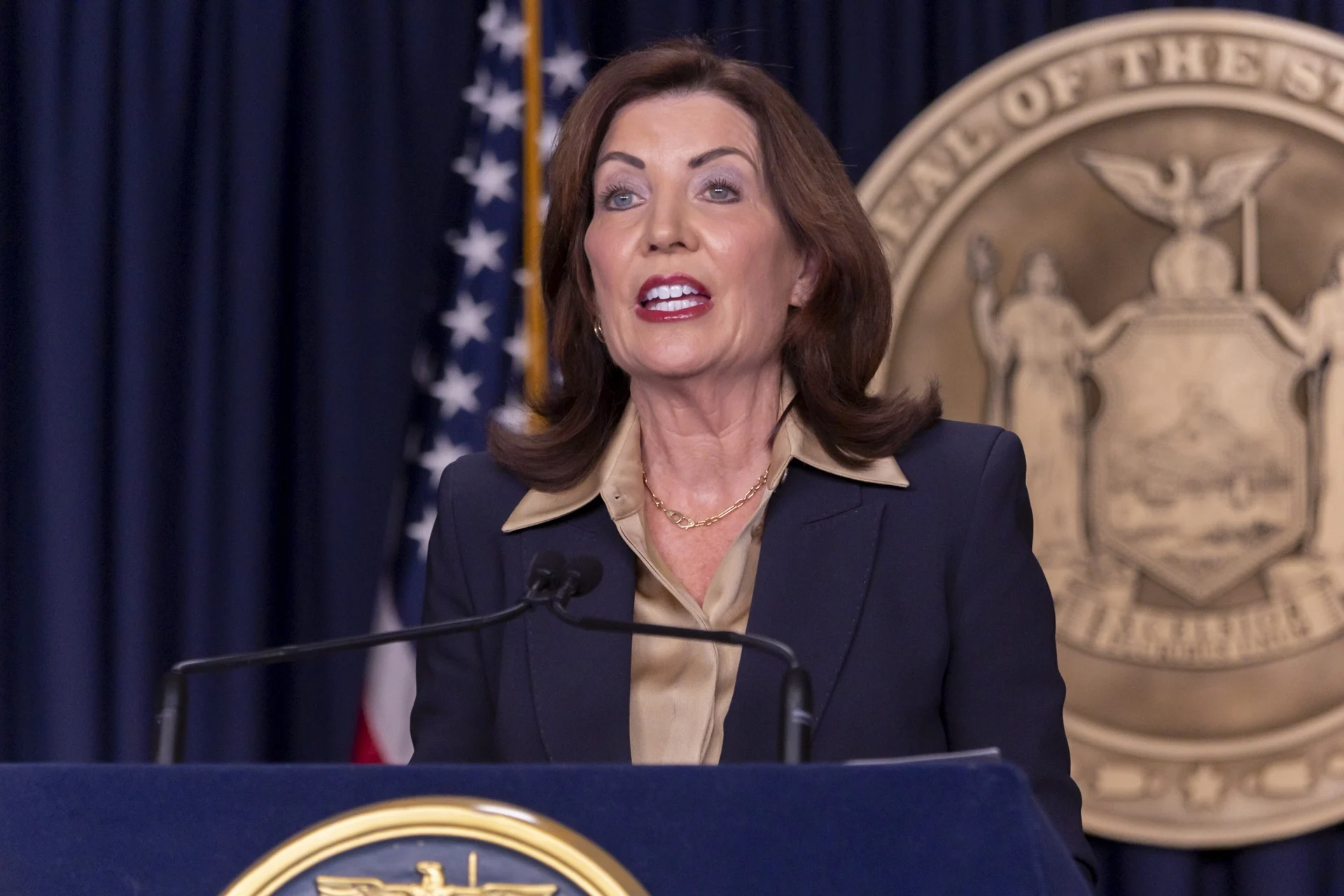
The Governor of New York, Kathy Hochul, and New York City Mayor Zohran Mamdani took another step today in their universal early education agenda by announcing the communities that will have access to the first 2,000 seats in the new 2-K program this fall — an initiative backed by a $73 million investment.
The funding is part of the $1.2 billion package previously unveiled by Hochul to strengthen child care and early childhood education across the city, one of the key campaign promises of the now Social Democratic mayor.
At the time of the announcement, the governor also outlined additional funds to reinforce the existing 3-K early education infrastructure, a program launched under former Mayor Bill de Blasio (2014–2021).
When the 2-K initiative was introduced in January, Mayor Mamdani explained that its first phase would offer 2,000 seats, with the goal of eventually expanding into a universal program — a commitment supported by the governor.
State investment in child care and preschool services is expected to increase to $4.5 billion by fiscal year 2027.
Among the first communities set to benefit from the 2,000 seats are Upper Manhattan and Inwood — areas with large Dominican populations — as well as Fordham and Kingsbridge in the Bronx, a borough with a Latino majority.
In East Brooklyn, Canarsie, Brownsville, and Ocean Hill will also be included. Meanwhile, Ozone Park and the Rockaways are among the neighborhoods that will see the rollout of the 2-K program.
International
Warner Bros. Developing First ‘Game of Thrones’ Movie With ‘Andor’ Writer

Warner Bros. is developing the first feature film based on the hit saga Game of Thrones, with Beau Willimon — screenwriter of Andor — attached to direct, according to a report published Tuesday by Page Six.
The project, currently in early development, will focus on the conquest of King Aegon I Targaryen. A separate television adaptation centered on the same historical storyline within the franchise is also in early stages at HBO.
However, the outlet noted that it remains unclear whether the film will move forward following the recent acquisition of Warner Bros. Discovery by Paramount Skydance.
If the merger is finalized, the movie could potentially be shelved, although that scenario appears unlikely given that the Game of Thrones franchise remains one of HBO’s most valuable and beloved properties.
After six seasons adapting the work of George R. R. Martin, the platform expanded the universe with House of the Dragon, a prequel series set 200 years before the events of Game of Thrones that explores the history of House Targaryen.
International
Spain’s Prime Minister to Address Nation Amid Trump’s Trade Threats

The Prime Minister of Spain, Pedro Sánchez, will deliver an institutional address this Wednesday at the Moncloa Palace regarding the escalating situation in the Middle East and recent threats directed at Spain by U.S. President Donald Trump.
The Spanish government announced that Sánchez will make a statement at 9:00 a.m. local time to outline his position on the latest developments following the U.S. and Israeli attacks on Iran.
Sánchez is expected to reiterate Spain’s reasons for opposing the use of U.S. military bases on Spanish soil in the operation—an action he has already described as being outside international law—while also expressing criticism of the Iranian regime.
Government sources indicated that the address had been planned prior to Trump’s remarks criticizing Spain’s stance. However, following those comments, Sánchez is now also expected to respond directly to the U.S. president’s statements.
Trump has threatened to “cut all trade with Spain” and said he wants “nothing to do” with the country after Madrid refused to authorize the use of the Morón and Rota military bases in southern Spain for operations against Tehran.
The U.S. president also labeled Spain “a terrible NATO partner” and warned that “no one” would tell him he could not use the facilities.
In response, the Spanish government stated that Spain fulfills its commitments to NATO and European defense. It also warned Trump that any review of bilateral trade relations must respect international law and the agreements in place between the European Union and the United States.
-

 International3 days ago
International3 days agoIran Reports 201 Dead, 747 Injured After U.S. and Israeli Strikes
-

 International3 days ago
International3 days agoPope Leo XIV Urges End to ‘Spiral of Violence’ in Middle East
-

 International2 days ago
International2 days agoBrazil’s Supreme Court Rejects Bolsonaro’s Bid for House Arrest
-

 International4 days ago
International4 days agoSecurity Council to Hold Emergency Meeting on Middle East Crisis
-

 International5 days ago
International5 days agoTrump Floats “Friendly Takeover” of Cuba Amid Rising Tensions
-

 Sin categoría4 days ago
Sin categoría4 days agoTrump: ‘We Think It’s True’ Amid Claims Iran’s Supreme Leader Was Killed
-

 International5 days ago
International5 days agoArgentina’s Senate Reviews Milei-Backed Labor Overhaul
-

 International2 days ago
International2 days agoAnti-ICE Billboard Campaign Targets Immigration Spending in 31 U.S. Cities
-

 International2 days ago
International2 days agoTrump Warns of ‘Major Wave’ of Attacks as Iran Conflict Escalates
-

 International2 days ago
International2 days agoMexico Calls for Immediate Probe After National Dies in ICE Custody
-

 International20 hours ago
International20 hours agoSpain’s Prime Minister to Address Nation Amid Trump’s Trade Threats
-

 International20 hours ago
International20 hours agoNew York Announces First 2,000 Seats in Universal 2-K Program
-

 Central America2 days ago
Central America2 days agoPanama Canal Monitoring Trade as Middle East Conflict Disrupts Shipping
-

 International2 days ago
International2 days agoBolivia Orders Three Investigations Into Deadly Military Plane Crash
-

 Central America20 hours ago
Central America20 hours agoGuatemala’s Attorney General Fails in Bid for Top Court Seat Amid Corruption Allegations
-

 International20 hours ago
International20 hours agoWarner Bros. Developing First ‘Game of Thrones’ Movie With ‘Andor’ Writer









































